|
Saturdee Opry
Links # 132: Semi-Segue Edition
Saturdee Opry Links is at last here for your delight, merriment, or, if you
prefer, dyspepsia and anxiety! It's the semi-segue edition! Today: giant flies,
singing birds, meowing sopranos, the sublime Natalie Dessay, operatic ingenue
Masabane Cecilia Rangwanasha, lost arias by Alfredo Catalani, water nymphs,
Captain Kangaroo, Franco Corelli, two Marias, love and death, effervescent
Mozart, Italian unification, and hell's fury! Prelude, Overture, plus ten
selections and encore by Bach, I mean The Toys, I mean Sumi Jo. Well, you'll
have to see and hear for yourselves. Or you don't.
Saturdee Opry Links Prelude.
SOL was terrorized by deranged cats all night, and is only now somewhat awake.
Here is a little bon bon while you stand by.
https://www.youtube.com/watch?v=QNyR6rsGDyg
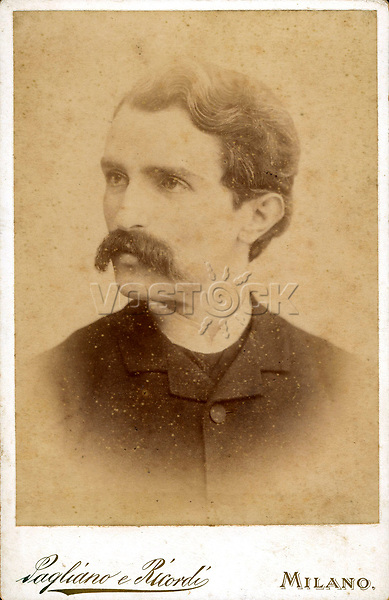

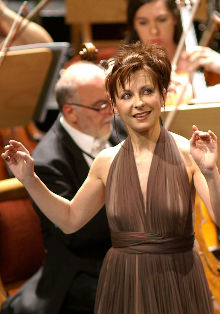
Catalani
The Toys
Dessay
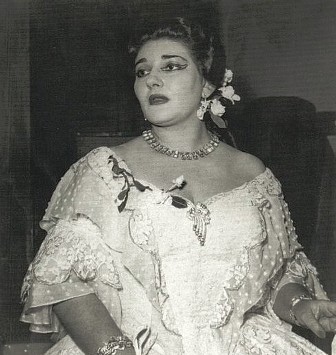

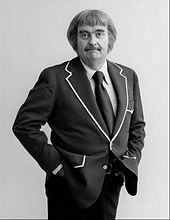
Young Maria Callas
Masabane Cecilia Rangwanasha
Kangaroo
Saturdee Opry Links Overture.
Donizetti, "The Elixir of Love."
(Complete with grape-stomping.)
https://www.youtube.com/watch?v=xri8-1IgRDE
1.
We open with a tour-de-force of coloratura singing with the lamentably retired
soprano, Natalie Dessay. This is a long clip---almost 40 hours. Well, more like
six minutes, but for the average SOL listener, that means it might as well be 40
hours. This is the very beautiful, ridiculously lyrical "Bell Song," or "Air de
Clochettes," or, if you prefer the title, "Où va la jeune Hindoue," from "Lakme,"
by Leo Delibes. Of particular delight is the "scat singing" toward the end, a
call-and-answer with tinkly. . .yes, you guessed it, you shrewd person, you. .
.bells. Sing along! "Where goes the young India girl, daughter of pariahs / when
the moon plays on the tall mimosa trees?"
https://www.youtube.com/watch?v=5LGxK5xhrp4
Setting: A public square in a town in India
Synopsis: Ordered by her father, Lakmé sings the legend of the pariah's
daughter. The girl was walking through the forest at night and comes upon a
stranger who has been set upon by wild animals. She rings a magic bell that is
on her wand and saves the man, who is actually Vishnu, the son of Brahma the
Creator. Vishnu takes her up to paradise for saving him.
Translation:
http://www.aria-database.com/search.php?individualAria=152
About Ms. Dessay:
https://en.wikipedia.org/wiki/Natalie_Dessay
About "Lakme."
https://en.wikipedia.org/wiki/Lakm%C3%A9
SOL EXTRA!
Let's all sing like the. . .you know. Well, they used, to, anyhow.
https://www.classicfm.com/composers/mozart/spectacular-colourful-bird-chorus-sings-opera-duet/
2.
For some of you, your introduction to the beauty of opera might well have come,
somewhat incongruously, in the disturbing 1981 movie, "Diva." You'll recall,
perhaps, the unknown singer, Wilhelmina Fernandez, singing "Ebben ne andro
lontano," from "La Wally," by Alfredo Catalani, in the film (and also acting.)
This quickly resulted, incidentally, in Ms. Fernandez no longer being unknown,
and giving her the operatic career she had long worked toward. (For that matter,
it did much to advance the popularity of "Wally.") Well, here is another young,
little known singer, Masabane Cecilia Rangwanasha, in a performance of the same
aria with piano accompaniment, made specially during pandemic lockdown by the
Royal Opera.
https://youtu.be/ke9yQ7HR_sY
Synopsis:
Wally (pronounced, roughly, waw-LEE), a young woman in 19th century Switzerland,
is ordered by her father to marry his smug jackass friend, Gellner. She decides
her only recourse is to leave her beloved home. "Well, then, I shall go far
away. . ."
Translation:
http://www.aria-database.com/search.php?individualAria=605
ANNND: How it can look on stage. With Saioa Hernandez.
https://www.youtube.com/watch?v=aolfgj6vIIA
Oh, and yes, here is that scene in "Diva."
https://www.youtube.com/watch?v=fJKpYnMMKKM
About Ms. Rangwanasha:
http://www.roh.org.uk/people/masabane-cecilia-rangwanasha
3.
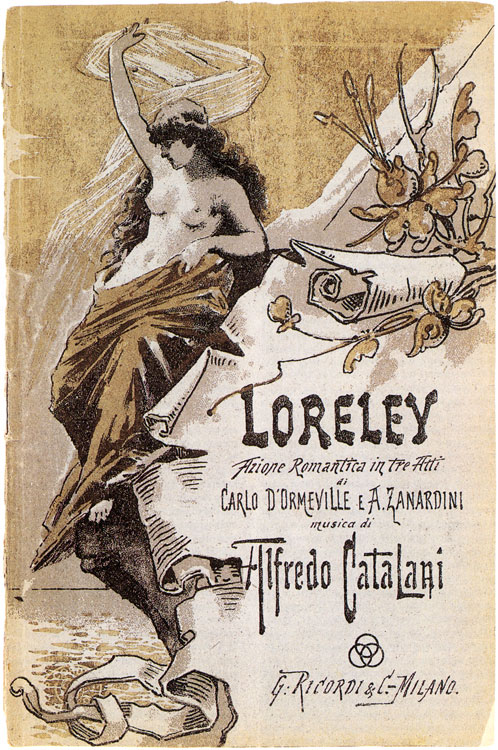
"Catalani" is not one of the names that springs to mind when asked to name the
greatest operatic composers. The poor fellow died of tuberculosis at 39, and
only one of his six operas is still performed today with any frequency ("La
Wally.") Yet the legendary conductor, Arturo Toscanini, thought that Alfredo
Catalani was the greatest operatic composer of his era, and so revered the man's
music that he named his first daughter, "Wally." There were other champions of
note. Catalani's 1883 opera, "Dejanice," was praised by, of all people, the
iconoclast Gustav Mahler, who repeatedly recommended that it be performed in
Germany (it lost out to "La Gioconda," by Ponchielli.") Aside from the now "hit
aria," "Ebben? Ne andro lontano" (see post # 2), Catalani's music is, for the
most part, unknown and unheard. Here is an aria for soprano that perhaps
anticipated the subtle beauty of "Ebben. . ." from "La Wally"---this from his
opera based on German myth, "Loreley." I can't find a translation, but the gist
concerns a wronged young woman who is, by magic, transformed into a kind of
siren living along the Rhine River, luring sailors to their demise. In this
scene: Walter, the man who callously seduced Loreley when she was mortal, is
preparing for his wedding to Anna. His friend, Hermann, warns Anna that she is
about to give herself to a faithless man. Nevertheless, the wedding procession
to the church begins. At this point the sky begins to glow with a mysterious
light. Loreley appears and sings a love song to Walter. He casts Anna aside and
rushes into the arms of Loreley crying "I am yours, be mine." Instead, Loreley
flings herself into the river, leaving Walter on his knees. As Anna falls
lifeless to the ground, Loreley reappears on a rock in the river. The soprano
here is the wonderful Mirella Freni. This is the beautiful "Amor, Celeste
Ebbrezza."
https://www.youtube.com/watch?v=9MCBAtNKXrw
About "Loreley":
https://en.wikipedia.org/wiki/Loreley_(opera)
4.
Interesting. Very few Catalani opera excerpts are available on Youtube, chiefly
endless versions of "Ebben. . ." from "La Wally." There is, however, a tenor
aria from his largely forgotten opera, "Loreley," and it is intriguing. As with
"Ebben. . ." and "Amor, Celeste Ebbrezza" (post # 3), it has a kind of dreamy,
meditative quality before the "big finish" one would expect. Catalani's musical
character was compared vaguely to Puccini's in their time, and---though I could
not explain technical similarities as a musician could---there is a sort of
poetic, emotional similarity. Not pronounced, more like a distant cousin. So
here is Franco Corelli with the rarity, "Nel Verde Maggio," from act one of the
German myth, "Loreley." "In the green of May. . ."
Synopsis: This is probably where Walter, who is betrothed to one Anna of Rehberg,
sings a love song to the waif, Loreley, as he strolls the banks of the Rhine one
may evening. Oh, those tenors, eh? Poor Loreley is swept off her feet, perhaps
literally, and is "seduced." (More: Walter than summons his friend Hermann and
tells him that he is torn between "lawful and unlawful love". Although Hermann
is himself in love with Anna, he counsels Walter to be true to his fiancée. When
Walter next encounters Loreley, he tells her that although he loves her, he will
marry Anna. He leaves Loreley who has fallen to the ground in a faint. Herman,
lamenting that he has yielded his beloved Anna to such a man, appeals to the God
of the Rhine and dedicates himself to avenging the wrong done to Anna.)
(No translation available.)
https://www.youtube.com/watch?v=hU8DRfWGvxI
SOL EXTRA!
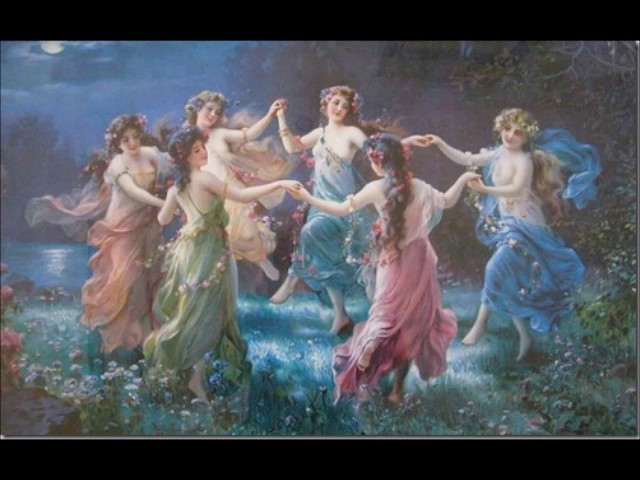
While on the subject of Alfredo Catalani (see posts # 2 and 3)---deemed the
greatest operatic composer of his day by Arturo Toscanini---here is an
orchestral excerpt from his opera, "Loreley." Based on a German myth (and
co-starring Alberich, of "Ring" fame), "Dance of the Water Nymphs." Wagner, it
isn't! (Though Catalani did emulate aspects of Wagner's music, as did many
composers of the day.)
https://www.youtube.com/watch?v=YajksR8J1GE
5.
One aria with "maggio" in the title deserves another. At least at SOL, it does,
right? Our motto: "Substituting cheap device for scholarship since 2010." "Maggio,"
of course, is "May" in Italiano---and also the brand of carrots Captain Kangaroo
kept in his pockets for Bunny Rabbit, if you are keeping score at home. Now,
some contend that the composer, Umberto Giordano, didn't exactly write
melodiously, when it came to arias---that, rather, his pieces were declamatory,
expository, climaxing with exclamatory. At least that's their story---and I
think there is some truth in it. And yet the arias are apt to make geese walk up
and down your arms (and perhaps elsewhere), as all great arias should. Now, I
listened to several versions of "Come un bel di maggio" ("Like a beautiful day
in May") from "Andrea Chenier," the (true) story of a poet and champion of the
people executed in the French Revolution. Here, the imprisoned Chenier writes
his last verse, just before the morning of his execution. Placido Domingo's
rendition was plaintive, poignant. Franco Corelli's was heroic. But the
underrated and rather forgotten tenor of yore, Aureliano Pertile, sang with
riveting intensity, gripping drama---and somehow, that seems best suited to the
circumstance.
https://www.youtube.com/watch?v=k8bEeSxGMnk
Setting: In the courtyard of the Prison of St. Lazare
Synopsis: Waiting for dawn and the Trumbil, Chénier has been writing a poem. He
recites it to Roucher at his urging.
Translation:
http://www.aria-database.com/search.php?individualAria=52
ANNNND, if you wish to do a "taste test," as I did, here is Domingo:
https://www.youtube.com/watch?v=o7inOr_gnig
And here is Corelli:
https://www.youtube.com/watch?v=c6AdciCKpFI
6.
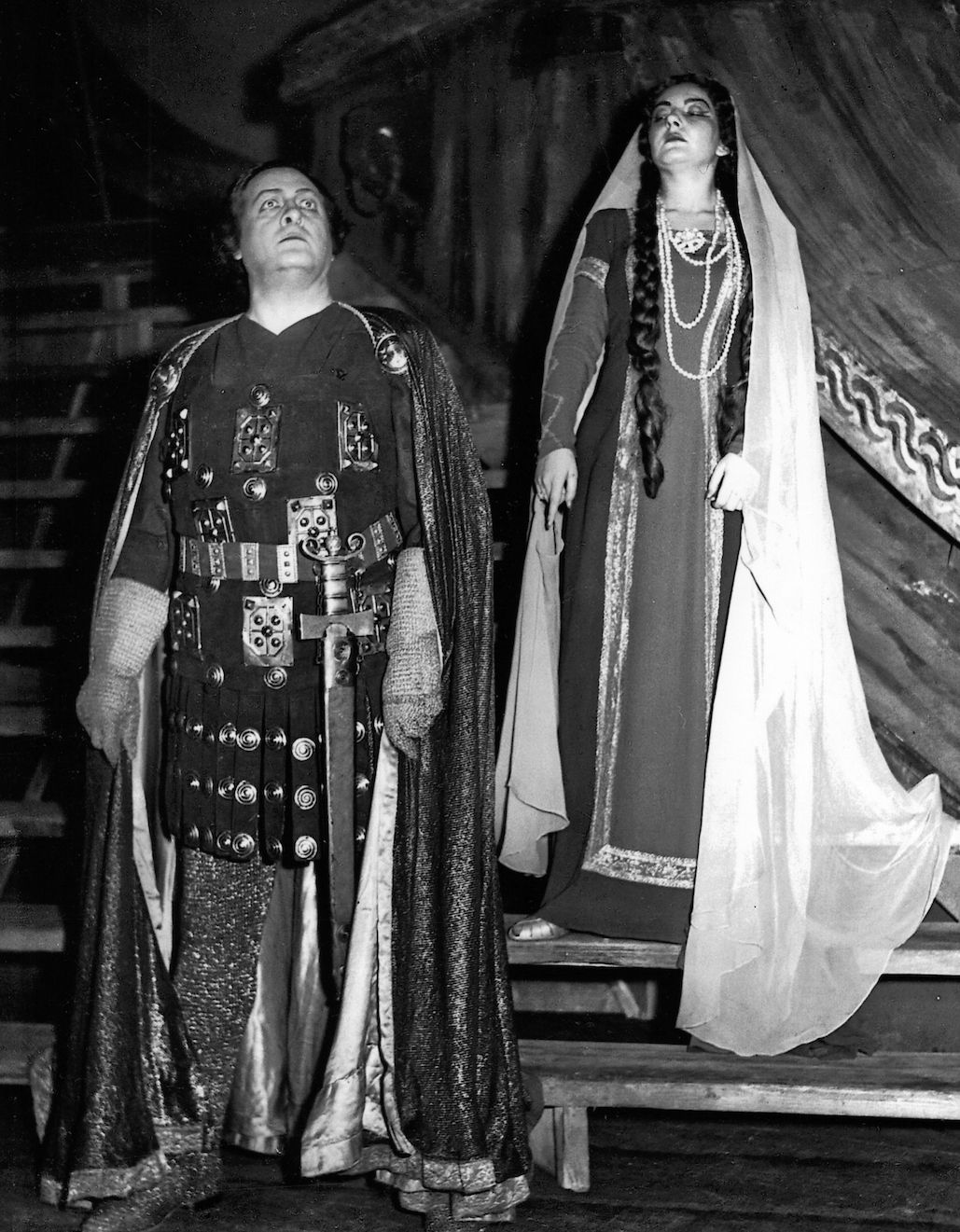
Callas as Isolde
Poor Chenier was executed, and poor Tristan was mortally wounded, dying just as
Isolde was at long last reunited with him. Now there's a clumsy segue, but it
helps me to introduce the fat lady, Maria Callas. Now now---don't be upset with
that characterization. I am playing on "the fat lady sings" cliche in opera, of
course, and making the point that Callas was originally quite the large woman.
It was through Herculean (heroic?) effort that she slimmed down to waif-size
years later, becoming a model of haute couture chic and glamor---changing the
quality of her voice in the process. Yes, Callas was once, as Henry Higgins sang
in "My Fair Lady," a "large Wagnerian. . .with a voice that shatters glass."
Here, from way back in her ur-liest career (1949!), she actually sings the "Liebestod"
from Wagner's "Tristan und Isolde," ("big voice" repertory.) Yes, the "love
death." Yes, that chord, that finally resolves after nearly five hours, pretty
much shattering emotions of listeners. Quite a trick ol' Richard had up his
sleeve. Here is the great Callas (literally and figuratively.) This is "Mild und
Liese," from the opera's ending. "Mildly and gently, see how he smiles. . ."
(Here sung in Italian as "Dolce e Calmo.")
https://www.youtube.com/watch?v=BB45LsgWF5w
Synopsis : After Tristan has died, Isolde looks upon him in a trance. She
believes that she sees her beloved coming alive again as she hears a lovely
melody around her. The hallucinations become stronger and stronger until at
last, she falls down dead next to Tristan.
Translation:
http://aria-database.com/translations/tristan06_mild.txt
7.
How to segue from the "lovedeath" of "Tristan und Isolde," as sung by Callas?
Hmm. . .Damned if I know. Oh, wait---how about this: let's go from Maria Callas
to another Maria. Ewing, to be specific. Annnnd, she can take us away from the
gloom and doom of "Tristan" and right into the light, bright world of Rossini!
Fair enough? Segue done. Here is the wonderful Ms. Ewing---yes, the one who
"scandalized the opera world" by doing Strauss's "Salome" totally nekkid (and
with the, uh, "credits" to make it good.) But let us remember the voice, not
the, uh, well, you know. Sparkling, effervescent, uplifting.
https://www.youtube.com/watch?v=d4kwM5Ylr4k
Setting: A room in Dr. Bartolo's house
Synopsis: After having read the letter from Lindoro (Count Almaviva), Rosina is
filled with joy. She sings of her love for him.
Translation:
http://www.aria-database.com/search.php?individualAria=25
About Ms. Ewing:
https://en.wikipedia.org/wiki/Maria_Ewing
8.
In today's quasi-segue edition, SOL moves along from Maria Ewing to. . .wings.
Specifically, golden wings, as in "Go, thoughts, on golden wings," from the
deeply loved chorus from Verdi's "Nabucco," "Va pensiero." It is widely believed
that this moving anthem had a galvanizing impact on the people of the various
Italian city-states, sparking the movement that led to a unified Italy. Here,
the great conductor/scholar, James Conlon, leads the chorus and orchestra of the
Teatro Le Fenice.
https://www.youtube.com/watch?v=aiSSz0snWzA
Translation:
https://www.liveabout.com/va-pensiero-lyrics-and-text-translation-724034
SOL EXTRA!
HOW VERDI'S MUSIC BROUGHT ITALY TOGETHER:
https://www.bbc.com/culture/article/20131002-verdi-when-music-meets-politics
9.

"Help me!"
Segue time again. . .Hmmm. . .from "wings" to. . .hmmm. . .can't think of any
"wings" arias. Or "fly" arias. Oh, wait! Yes! There is a "fly" aria---or rather,
a duet, and a mildly lurid one. But bright lurid! Fun lurid! Yes, here is the
wonderful, badly missed Natalie Dessay duetting with a fly! "I kid you
not."---Jack Paar. From "Orpheus in the Underworld," by Jacques Offenbach, this
is "Duo de la mouche"---"the fly duet." With English buzztitles. (Oh, by the
way, that fly is her husband, Laurent Naouri.)
https://www.youtube.com/watch?v=XzG4B8GiWKc
Synopsis:
Jupiter discovers where Pluton has hidden Eurydice, and slips through the
keyhole by turning into a beautiful, golden fly. He meets Eurydice on the other
side, and sings a love duet with her where his part consists entirely of buzzing
("Duo de la mouche"). Afterwards, he reveals himself to her, and promises to
help her, largely because he wants her for himself. Pluton is left furiously
berating John Styx.
FINAL BOW:
Yes, this is hyper-familiar, a "greatest hit" aria that has become cliche and
fodder for evil television commercials. Sigh. Of course, it is also a superb,
inspired piece of writing, meant to, in Mozart's day, showcase singing that was
probably thought to have been all but impossible. The reason I am posting it
here is that Sumi Jo sings it. Yes, there are oodles of sopranos who dispatch it
wonderfully well, but nobody, at least to my ear, with quite the aplomb and
panache and technique of Ms. Jo. (I was lucky to see her do this with LA Opera
long ago.) Oh, and there is another reason for posting it: all the clips of Ms.
Jo singing this aria on Youtube are of terrible visual quality---except this
one, which, for some reason, only recently turned up in my searches. This is "Der
Hölle Rache kocht in meinem Herzen," or "Hell's revenge cooks in my heart" (for
Donald Trump, one hopes)---the Queen of the Night's aria from "The Magic Flute."
Okay? Good enough for you? If not, hell's revenge. . .
https://www.youtube.com/watch?v=ZAiCbYc4hQ0
Setting: Pamina's room
Synopsis: Giving her a knife, the Queen of the Night tells Pamina to kill
Sarastro in order to get the Shield of the Sun from him.
Translation:
http://www.aria-database.com/search.php?individualAria=194
Saturdee Opry Links ENCORE!
Okay, this isn't opera, I admit. Yet it involves classical music, and a great
opera star! So. . .Maybe you find it schmaltzy, or saccharine, but you know me,
I'm a sucker for this kind of thing. What I really love about this is that this
great little pop song by The Toys---which is based on Bach's minuet in G---has
been turned into a ballad with lush orchestration. Like it or not, Ms. Jo sings
it with utter sincerity. What would Barbara Harris, Barbara Parritt, June
Montiero---The Toys---think?
https://www.youtube.com/watch?v=GOTJW2pFjvo
And the original:
https://www.youtube.com/watch?v=aGDZc9bdUZM
And the original original!
https://www.youtube.com/watch?v=xlADKJOOdOE
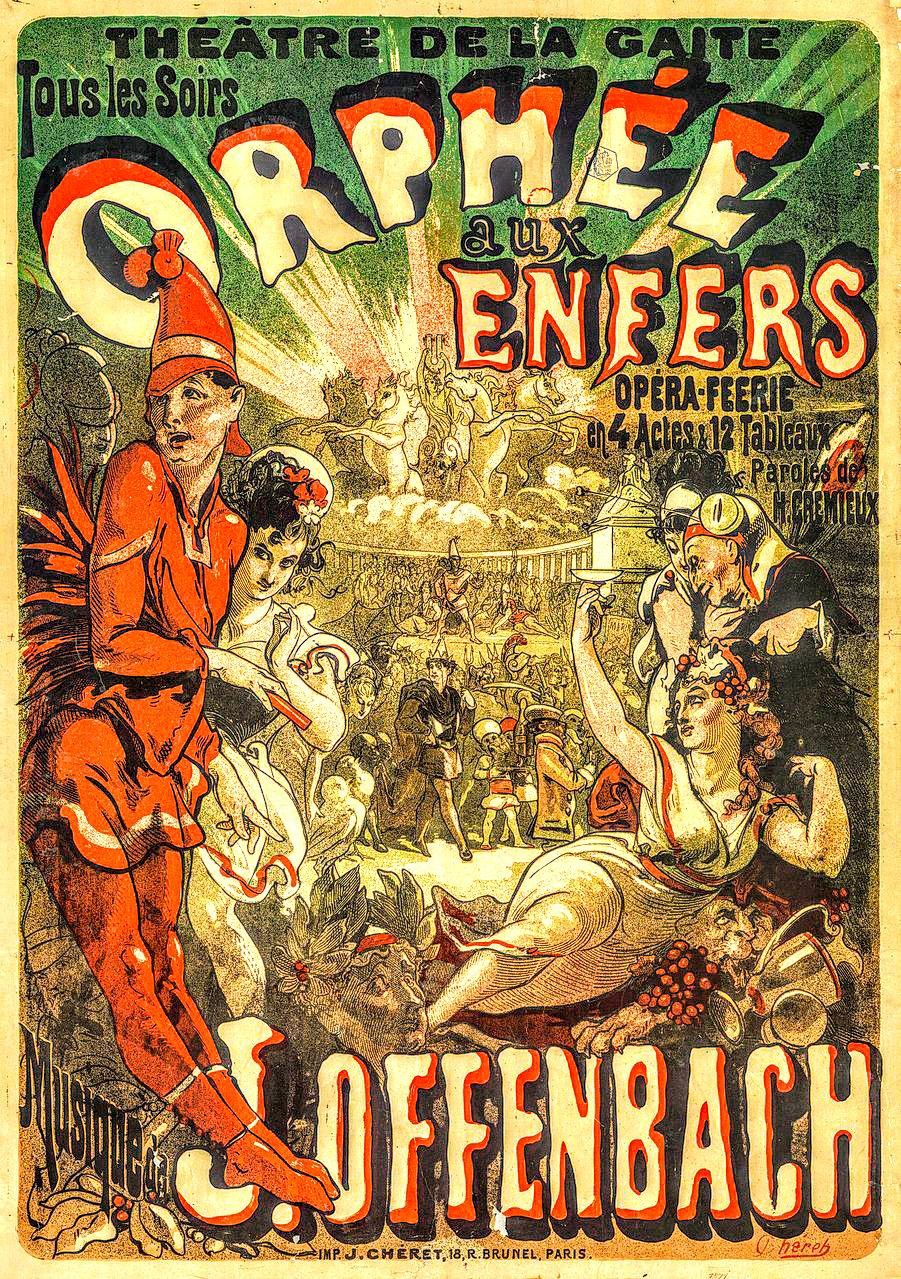
Back to Opera Links
Back to Home Page
|



